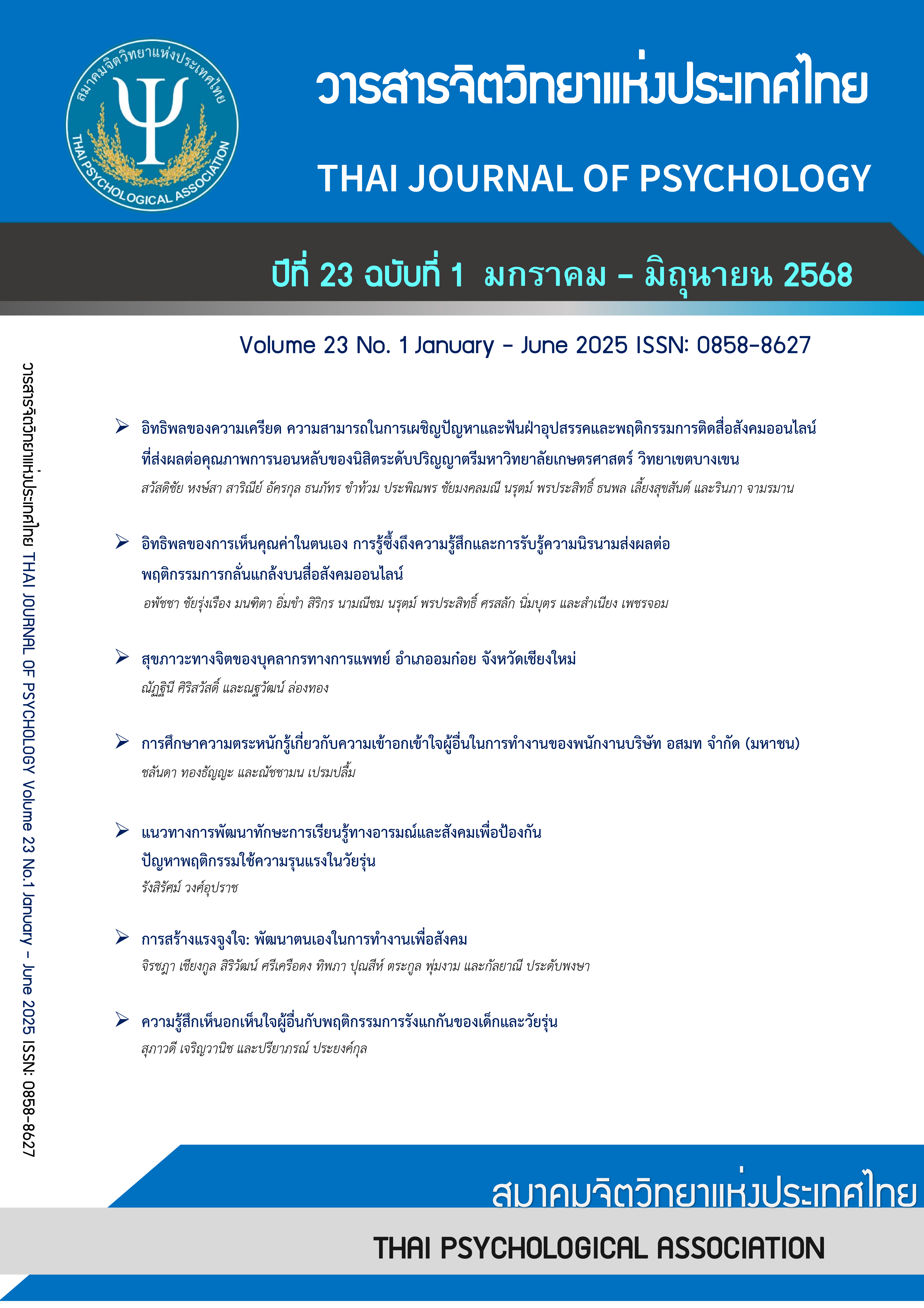แนวทางการพัฒนาทักษะการเรียนรู้ทางอารมณ์และสังคม เพื่อป้องกัน ปัญหาพฤติกรรมใช้ความรุนแรงในวัยรุ่น
คำสำคัญ:
วัยรุ่น, สุขภาพจิต, การเรียนรู้ทางอารมณ์และสังคม, พฤติกรรมใช้ความรุนแรงบทคัดย่อ
วัยรุ่นเป็นช่วงรอยต่อระหว่างวัยเด็กและวัยผู้ใหญ่ จึงมีการเปลี่ยนแปลงของพัฒนาการที่สำคัญในหลายด้าน โดยสิ่งแวดล้อมรอบตัวจะมีบทบาทสำคัญอย่างมากต่อการหล่อหลอมพฤติกรรม กล่าวคือ หากวัยรุ่นอยู่ในสภาพแวดล้อมที่ไม่เหมาะสม อาจมีความเสี่ยงต่อปัญหาพฤติกรรมใช้ความรุนแรงได้ ซึ่งจากการศึกษาที่ผ่านมา พบว่า ภูมิหลังของวัยรุ่นที่มีปัญหาพฤติกรรมใช้ความรุนแรงส่วนใหญ่มาจากสภาพแวดล้อมที่ไม่เอื้อำนวยให้เกิดการพัฒนาและเรียนรู้ในทิศทางที่เหมาะสม
ปัญหาพฤติกรรมใช้ความรุนแรงของวัยรุ่นมีหลายรูปแบบ ซึ่งปัญหาดังกล่าวมีสาเหตุมาจากทั้งปัจจัยภายในและภายนอกที่มีความเชื่อมโยงกันอย่างซับซ้อน ดังนั้น การจัดการกับปัญหานี้จึงต้องจำเป็นต้องพิจารณาทุกปัจจัยร่วมกันอย่างรอบคอบ ซึ่งจากการศึกษาที่ผ่านมา พบว่า การส่งเสริมทักษะการเรียนรู้ทางอารมณ์
และสังคมเป็นแนวทางในการป้องกันปัญหาพฤติกรรมใช้ความรุนแรงของวัยรุ่นได้ สามารถทำได้หลากหลายรูปแบบ และนำไปใช้ได้อย่างครอบคลุมทุกบริบทที่เกี่ยวข้อง ซึ่งนับได้ว่าเป็นแนวทางที่มีประสิทธิภาพในการนำมาใช้ป้องกันปัญหาพฤติกรรมใช้ความรุนแรงของวัยรุ่น
ดังนั้น บทความนี้จึงต้องการนำเสนอแนวทางการพัฒนาทักษะการเรียนรู้ทางอารมณ์และสังคม
เพื่อป้องกันปัญหาพฤติกรรมใช้ความรุนแรงในวัยรุ่น โดยครอบคลุมเนื้อหาที่สำคัญ ได้แก่ ลักษณะสำคัญ
ตามพัฒนาการของวัยรุ่น ลักษณะและสาเหตุของพฤติกรรมใช้ความรุนแรงของวัยรุ่น แนวทางการจัดการปัญหาพฤติกรรมใช้ความรุนแรงของวัยรุ่น คุณลักษณะของการเรียนรู้ทางอารมณ์และสังคมของวัยรุ่นและแนวทางการพัฒนา เพื่อเป็นแนวทางในการให้ความช่วยเหลือและสนับสนุนให้วัยรุ่นมีทักษะที่จะเป็นประโยชน์ต่อการนำไปใช้จัดการกับปัญหาพฤติกรรมที่อาจจะเกิดขึ้นได้อย่างเหมาะสม
เอกสารอ้างอิง
เอกสารอ้างอิง
American Psychological Association [APA]. (1993). Report of the APA commission on violence and youth. https://www.apa.org/pi/prevent-violence/resources/violence-youth.pdf
Cipriano, C., Strambler, M. J., Naples, L., Ha, C., Kirk, M. A., Wood, M., Sehgal, K., Zieher, A., Eveleigh, A., McCarthy, M. F., Funaro, M. C., Ponnock, A., Chow, J., & Durlak, J. (2023). The state of evidence for social and emotional learning: A contemporary meta-analysis of universal school-based SEL interventions. https://doi.org/10.31219/osf.io/mk35u
Collaborative for Academic Social and Emotional Learning [CASEL]. (2025). What does the research say? https://casel.org/fundamentals-of-sel/what-does-the-research-say/
Collaborative for Academic Social and Emotional Learning [CASEL]. (2023). CASEL’s framework: What are the core competence areas and where are they promoted? https://casel.org/casel-sel-framework-11-2020/?view=true
Department of Juvenile Observation and Protection [DJOP]. (2024). Annual judicial statistics, Thailand B.E. 2567. https://www3.djop.go.th/storage/files/2/สถิติประจำปี/st-67.pd
Department of Mental Health [DMH]. (2013). Guidelines for supporting and assisting adolescents with violent behavior. https://mhc7.dmh.go.th/wp-content/uploads/2019/12/แนวทางการดูแลช่วยเหลือวัยรุ่นที่มีพฤติกรรมรุนแรง.pdf
Durlak, J. A., Mahoney, J. L., & Boyle, A. E. (2022). What we know, and what we need to find out about universal, school-based social and emotional learning programs for children and adolescents: A review of meta-analyses and directions for future research. Psychological Bulletin, 148(11-12), 765-782.
Elliott, D. S., & Mihalic, S. (2004). Issues in disseminating and replicating effective prevention programs. Prevention Science, 5(1), 47-53.
Ginsburg, H. P. & Opper, S. (2016). Piaget’s theory of intellectual development. https://dspace.sxcjpr.edu.in/jspui/bitstream/123456789/1034/1/Copy%20of%20piagets_theory_of_intellectual_development.pdf
Gross, B., & Hamilton, L. (2023). Student mental health and well-being: A review of evidence and emerging solutions. https://crpe.org/wp-content/uploads/SEL-Report-2023-Final.pdf
Harvard Graduate School of Education [HGSE]. (2023). Navigating SEL for teens: Help for educators in selecting the right social-emotional learning program for their teen students' needs. https://www.gse.harvard.edu/ideas/usable-knowledge/23/03/navigating-sel-teens
Kelly, O. A., Skoog-Hoffman, A., & Jagers, R. J. (2023). Collaborating with communities and caregivers: conditions for building authentic partnerships. https://library.belenetwork.org/wp-content/uploads/2023/07/EA-2-Learning-Brief_-4__.pdf
Limmanjing, J. (2020). Methods of guidance teaching. Ramkhamhaeng University.
Ma, A., Miller, A. A., Tucker, A., & Steele, L. (2023). Supporting parent and family engagement to enhance students’ academic, social, and emotional learning. https://casel.org/policy-brief-fce-2023/?view=1
McLeod, S. (2024). Erik Erikson's stages of psychosocial development. https://www.researchgate.net/publication/384931028_Erik_Erikson's_Stages_of_Psychosocial_Development
Schwartz, H. N., Skoog-Hoffman, A., Polman, J., Kelly, O. A., Bañales, J., & Jagers, R. J. (2023). Integrated learning, integrated lives: Highlighting opportunities for transformative SEL within academic instruction. https://casel.s3.us-east-2.amazonaws.com/UA5whSYh-R0useEn7-SEL-Innovations-2.pdf
United Nations Development Programme [UNDP]. (2024). Human development report 2023/2024. https://hdr.undp.org/system/files/documents/global-report-document/hdr2023-24reporten.pdf
World Health Organization [WHO]. (2024). World health statistics 2024: Monitoring health for the SDGs, Sustainable Development Goals. https://iris.who.int/bitstream/handle/10665/376869/9789240094703-eng.pdf?sequence=1
World Health Organization [WHO]. (2002). World report on violence and health. https://www.who.int/fr/publications/i/item/9241545615
ดาวน์โหลด
เผยแพร่แล้ว
รูปแบบการอ้างอิง
ฉบับ
ประเภทบทความ
สัญญาอนุญาต
ลิขสิทธิ์ (c) 2025 สมาคมจิตวิทยาแห่งประเทศไทย

อนุญาตภายใต้เงื่อนไข Creative Commons Attribution-NonCommercial-NoDerivatives 4.0 International License.
บทความที่ได้รับการตีพิมพ์เป็นลิขสิทธิ์ของสมาคมจิตวิทยาแห่งประเทศไทย
ข้อความที่ปรากฎในบทความแต่ละเรื่องในวารสารวิชาการเล่มนี้เป็นความคิดเห็นส่วนตัวของผู้เขียนแต่ละท่านไม่เกี่ยวข้องกับสมาคมจิตวิทยาแห่งประเทศไทย แต่อย่างใด ความรับผิดชอบองค์ประกอบทั้งหมดของบทความแต่ละเรื่องเป็นของผู้เขียนแต่ละท่าน หากมีความผิดพลาดใด ๆ ผู้เขียนแต่ละท่านจะรับผิดชอบบทความของตนเองแต่ผู้เดียว






